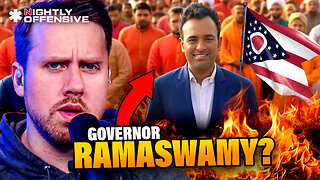Premium Only Content

15-Minute Cities
Locals = https://sweethomesa.locals.com/
POPULIST REVOLT = https://populistrevolt.com/
Christine Anderson, a member of the European Parliament, believes that COVID passports and QR codes that became widespread during the pandemic were only test runs for implementing “15-minute cities” aimed at tightening government control over people.
A 15-minute city is a neighborhood where a resident can reach everything they need, like a grocery store, doctor, and so forth within a 15-minute walk. According to Anderson, such cities are the beginning of tighter government control of people. The administration can exert control by deciding “you are no longer allowed to leave your 15-minute immediate area. They don’t have to fence it in or anything. It will be done via digital ID,” she said in an interview with Jan Jekielek’s “American Thought Leaders” program published on April 25.
“If you now fancy another store and it does not happen to be in your neighborhood, guess what? You won’t be going to that store anymore. Like I said, total control is what we’re talking about.”
In Europe, legislation is being pushed forward to set up 15-minute cities. According to Anderson, the Digital Green Certificate, the COVID pass introduced during the pandemic, was only a test run designed to get people used to producing a QR code and related requirements.
“Now, they’re slamming us with these 15-minute cities. Make no mistake, it’s not about your convenience. It’s not that they want you to be able to have all of these places that you need to get to close by. It’s not about saving the planet either,” Anderson said.
“With the 15-minute cities, they will have to have those before they can lock you down, and that’s what we were talking about here.”
“In Great Britain, some counties have already passed legislation. They will be able to impose a climate lockdown. That’s the next step. That’s what we are talking about. In order to do that, they will have to have these 15-minute cities.”
The next step, Anderson says, will involve restricting people within their localities, only allowing them to leave the place two or three times a year. However, the rich will be able to get away with these rules as they can buy off exit passes from the poorer segments, she stated.
“The poor people will be left in these 15-minute neighborhoods while the ones that are better off get to go wherever they want to go. This is what we are talking about.”
An article featured on the World Economic Forum’s (WEF) website in March last year called the concept of 15-minute cities “a lot more than a fad” and a consequence of the current times, specifically the pandemic.
“With COVID-19 and its variants keeping everyone home (or closer to home than usual), the 15-minute city went from a ‘nice-to-have’ to a rallying cry,” it claimed, adding, “As climate change and global conflict cause shocks and stresses at faster intervals and increasing severity, the 15-minute city will become even more critical.”
Anderson pointed out that Chinese communist-style “social credit” systems are already being tested out in Europe. “There are pilot projects already going on in Bologna. There, it’s called the ‘Bologna Wallet.’ In Vienna, it’s called the ‘Vienna Token.'”
“It’s voluntary for now, and it’s only pretty much enticing people. If you do this, you get some tickets for a little less, to go to the theater. Voluntary. Once again, [it’s the] first step,” she said.
“But soon, there will be a time when you don’t have a choice anymore. You have to have this Digital Green Certificate with this QR code. Then, they will tell you where you can go, what you can do, and what you cannot do.”
Anderson criticized “The Line” project being constructed in Saudi Arabia. A 200-kilometer-long, 200-meter-wide, 500-meter-high structure, The Line is projected to house up to 9 million people.
“If I wanted to get total control of the people, that’s exactly where and how I would house them, and then, have them on a three-meal-a-day prescription. Guess what will happen if you do not do as you are told—they will probably cancel those meals. It’s so easy,” she said.
“That’s what we’re talking about. When you really take all of this together, there is no other way for me to actually say this—it will be a complete impoverishment and enslavement of all the people. I’m stating it so clearly because that’s what it seems like, and that’s what it looks like to me.”
The concept of 15-minute cities is drawing heated debate on social media. When documentary maker Carla Francome posted a thread in February about the benefits of such cities, it soon attracted criticism.
One person suggested that though 15-minute cities sound great in theory, it would become a problem once the government tries to enforce it.
Another pointed out that if 15-minute cities were to become a reality, Francome would have to take a special permit to visit her father if he was living 30 minutes away from her.
“One day, you’ll be trapped in your 15 minute city, waiting for a drone to deliver your sweet and sour bugs and trying to remember what it was like to be on holiday,” author Lisa Keeble said in an April 22 tweet. “You’ll ask yourself- when did it all go wrong. When you applauded lockdowns and masks.”
Anderson also highlighted the fearmongering employed by governments to control people during the COVID-19 pandemic. “In Germany, there was a manual, an outline on how to get the people to do what the government wanted them to do to adhere to these restrictions,” she said.
“They outlined it there specifically, ‘Even though kids are at no risk of this COVID, we have to make them afraid. If they catch it and then they infect their grandparents, they’re responsible for having killed their grandparents.’ That’s the kind of thinking that went on in the governments.”
“A completely blown out of proportion kind of pandemic. For what? It was so the pharmaceutical companies could make billions and billions of dollars.”
Jekielek noted that there’s “unequivocal evidence” that the UK government was involved in sowing fear among its populace with regard to COVID-19 and had a specific strategy for doing so. Similar things were done in other countries, including the United States, he pointed out.
When asked whether this was the result of some kind of global coordination, Anderson replied, “Absolutely.”
“That is actually the scariest part of all of this. Had it only been two or three countries going rogue, we would have had the hopes another country would step in and put a stop to it,” she said.
“They were in lockstep with all of this. They literally read from the same script, repeating the same lines, ‘Build back better, safe and effective.’ Every single Western democracy was pretty much doing the same thing.”
-
 2:19:23
2:19:23
Slightly Offensive
9 hours ago $12.89 earnedGOV. RAMASWAMY? Vivek to import 1 BILLION INDIANS to OHIO | Nightly Offensive
76.2K48 -
 4:51:08
4:51:08
Wahzdee
12 hours agoSniper Elite Then Extraction Games—No Rage Challenge! 🎮🔥 - Tuesday Solos
64.5K3 -
 2:12:58
2:12:58
Robert Gouveia
12 hours agoSenator's Wife EXPOSED! Special Counsel ATTACKS; AP News BLOWN OUT
104K65 -
 55:07
55:07
LFA TV
1 day agoDefending the Indefensible | TRUMPET DAILY 2.25.25 7PM
56.8K14 -
 6:09:26
6:09:26
Barry Cunningham
18 hours agoTRUMP DAILY BRIEFING - WATCH WHITE HOUSE PRESS CONFERENCE LIVE! EXECUTIVE ORDERS AND MORE!
86K50 -
 1:46:37
1:46:37
Game On!
13 hours ago $0.51 earnedPUMP THE BRAKES! Checking Today's Sports Betting Lines!
51.6K3 -
 1:27:21
1:27:21
Redacted News
12 hours agoBREAKING! SOMETHING BIG IS HAPPENING AT THE CIA AND FBI RIGHT NOW, AS KASH PATEL CLEANS HOUSE
198K283 -
 1:08:28
1:08:28
In The Litter Box w/ Jewels & Catturd
1 day agoCrenshaw Threatens Tucker | In the Litter Box w/ Jewels & Catturd – Ep. 749 – 2/25/2025
116K57 -
 44:57
44:57
Standpoint with Gabe Groisman
1 day agoWill Byron Donalds Run for Florida Governor? With Congressman Byron Donalds
74.7K9 -
 1:06:25
1:06:25
Savanah Hernandez
12 hours agoEXPOSED: FBI destroys evidence as NSA’s LGBTQ sex chats get leaked?!
94.3K38